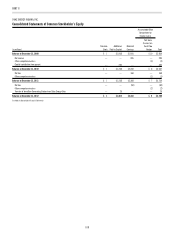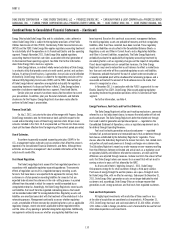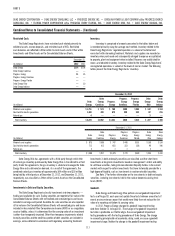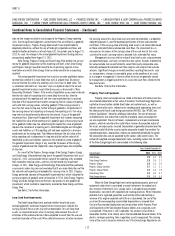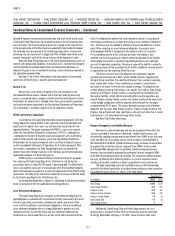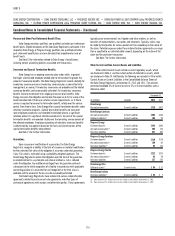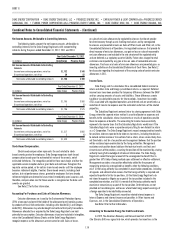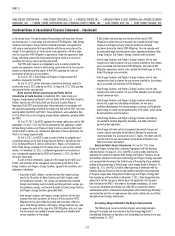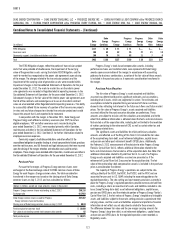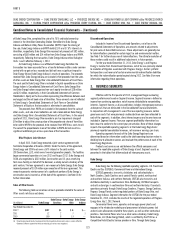Duke Energy 2012 Annual Report Download - page 136
Download and view the complete annual report
Please find page 136 of the 2012 Duke Energy annual report below. You can navigate through the pages in the report by either clicking on the pages listed below, or by using the keyword search tool below to find specific information within the annual report.
116
PART II
Combined Notes to Consolidated Financial Statements – (Continued)
DUKE ENERGY CORPORATION • DUKE ENERGY CAROLINAS, LLC • PROGRESS ENERGY, INC. • CAROLINA POWER & LIGHT COMPANY d/b/a PROGRESS ENERGY
CAROLINAS, INC. • FLORIDA POWER CORPORATION d/b/a PROGRESS ENERY FLORIDA, INC. • DUKE ENERGY OHIO, INC. • DUKE ENERGY INDIANA, INC.
Net Income Amounts Attributable to Controlling Interests.
The following tables present the net income amounts attributable to
controlling interests for the Duke Energy Registrants with noncontrolling
interests during the years ended December 31, 2012, 2011 and 2010.
Year Ended December 31, 2012
(in millions) Duke Energy Progress Energy
Net Income Amounts Attributable to Controlling
Interests
Income from continuing operations, net of tax $ 1,732 $ 348
Discontinued operations, net of tax 36 52
Net income attributable to controlling interests $ 1,768 $ 400
Year Ended December 31, 2011
(in millions) Duke Energy Progress Energy
Net Income Amounts Attributable to Controlling
Interests
Income from continuing operations, net of tax $ 1,705 $ 580
Discontinued operations, net of tax 1 (5)
Net income attributable to controlling interests $1,706 $ 575
Year Ended December 31, 2010
(in millions) Duke Energy Progress Energy
Net Income Amounts Attributable to Controlling
Interests
Income from continuing operations, net of tax $ 1,317 $ 860
Discontinued operations, net of tax 3 (4)
Net income attributable to controlling interests $1,320 $ 856
Stock-Based Compensation.
Stock-based compensation represents the cost related to stock-
based awards granted to employees. Duke Energy recognizes stock-based
compensation based upon the estimated fair value of the awards, net of
estimated forfeitures. The recognition period for these costs begin at either the
applicable service inception date or grant date and continues throughout the
requisite service period, or for certain share-based awards until the employee
becomes retirement eligible, if earlier. Share-based awards, including stock
options, but not performance shares, granted to employees that are already
retirement eligible are deemed to have vested immediately upon issuance, and,
therefore, compensation cost for those awards is recognized on the date such
awards are granted.
See Note 22 for further information.
Accounting For Purchases and Sales of Emission Allowances.
Emission allowances are issued by the Environmental Protection Agency
(EPA) at zero cost and permit the holder of the allowance to emit certain gaseous
by-products of fossil fuel combustion, including sulfur dioxide (SO2) and nitrogen
oxide (NOx). Allowances may also be bought and sold via third-party transactions.
Allowances allocated to or acquired by the Duke Energy Registrants are held
primarily for consumption. Emission allowances at cost are included in Intangibles,
net on the Consolidated Balance Sheets and the Duke Energy Registrants
recognize expense as the allowances are consumed or sold. Gains or losses
on sales of emission allowances by regulated businesses that do not provide
for direct recovery through a cost-tracking mechanism and by nonregulated
businesses are presented in Gains on Sales of Other Assets and Other, net, in the
Consolidated Statements of Operations. For regulated businesses that provide for
direct recovery of emission allowances, any gain or loss on sales of recoverable
emission allowances are included in the rate structure of the regulated entity
and are deferred as a regulatory asset or liability. Future rates charged to retail
customers are impacted by any gain or loss on sales of recoverable emission
allowances. Purchases and sales of emission allowances are presented gross as
investing activities on the Consolidated Statements of Cash Flows. See Note 12
for discussion regarding the impairment of the carrying value of certain emission
allowances in 2011.
Income Taxes.
Duke Energy and its subsidiaries fi le a consolidated federal income tax
return and other state and foreign jurisdictional returns as required. Deferred
income taxes have been provided for temporary differences between the GAAP
and tax carrying amounts of assets and liabilities. These differences create
taxable or tax-deductible amounts for future periods. Investment tax credits
(ITC) associated with regulated operations are deferred and are amortized as a
reduction of income tax expense over the estimated useful lives of the related
properties.
The Subsidiary Registrants entered into a tax sharing agreement with Duke
Energy, where the separate return method is used to allocate tax expenses and
benefi ts to the subsidiaries whose investments or results of operations provide
these tax expenses or benefi ts. The accounting for income taxes essentially
represents the income taxes that the Subsidiary Registrants would incur if the
Subsidiary Registrants were a separate company fi ling its own federal tax return
as a C-Corporation. The Duke Energy Registrants record unrecognized tax benefi ts
for positions taken or expected to be taken on tax returns, including the decision
to exclude certain income or transactions from a return, when a more-likely-than-
not threshold is met for a tax position and management believes that the position
will be sustained upon examination by the taxing authorities. Management
evaluates each position based solely on the technical merits and facts and
circumstances of the position, assuming the position will be examined by a taxing
authority having full knowledge of all relevant information. The Duke Energy
Registrants record the largest amount of the unrecognized tax benefi t that is
greater than 50% likely of being realized upon settlement or effective settlement.
Management considers a tax position effectively settled for the purpose of
recognizing previously unrecognized tax benefi ts when the following conditions
exist: (i) the taxing authority has completed its examination procedures, including
all appeals and administrative reviews that the taxing authority is required and
expected to perform for the tax positions, (ii) the Duke Energy Registrants do
not intend to appeal or litigate any aspect of the tax position included in the
completed examination, and (iii) it is remote that the taxing authority would
examine or reexamine any aspect of the tax position. Deferred taxes are not
provided on translation gains and losses where Duke Energy expects earnings of
a foreign operation to be indefi nitely reinvested.
The Duke Energy Registrants record tax-related interest expense in
Interest Expense and interest income and penalties in Other Income and
Expenses, net, in the Consolidated Statements of Operations.
See Note 24 for further information.
Accounting for Renewable Energy Tax Credits and Grants.
In 2009, The American Recovery and Reinvestment Act of 2009
(the Stimulus Bill) was signed into law, which provides tax incentives in the




